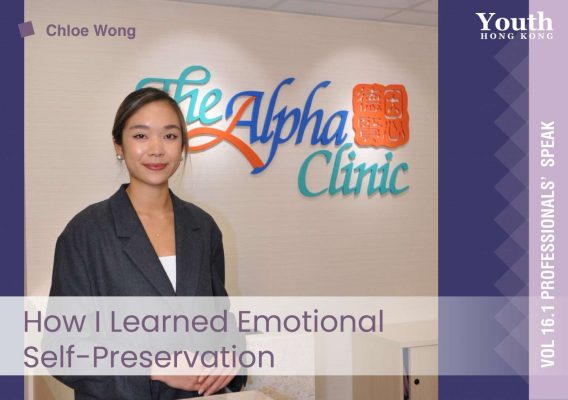//vol.16-1 Professionals Speak
How I Learned Emotional Self-Preservation
by Chloe H.Y. Wong
A career in psychology and counselling definitely takes a toll on a practitioner. An analogy I like to use is that being a psychologist can feel like being a sponge, soaking up patients’ emotions and negativity.
Particularly during the early stages of my professional journey, I found it tough to disengage from my work-related emotions at the end of a day’s work. At times, I even berated myself for what I perceived as personal weakness, for allowing myself to be so deeply affected. Though I had been trained in empathy, formal education had not necessarily equipped me with the needed tools to safeguard my own emotional well-being from resolving others’ hardships.
Bearing witness to clients’ trauma, struggles, and, most poignantly, their expressions of hopelessness, I realised that these are aspects of the profession that no university training could adequately prepare us for. Yet, mastering the art of emotional self-preservation is indispensable in order to avoid emotional burnout.
With experience, I learned to adopt a ritualistic practice in my professional routine: every day before leaving the office, I clap my hands three times and pat myself on the back just to remind myself that my workday is over, and that the line between work and personal life must be maintained.
This ritual served as a symbolic act of removing the burdens I had carried throughout the day, ensuring that their weight did not accompany me home. Nonetheless, and understandably, patients do reach out to me beyond office hours, typically during moments of crisis and urgency.
Therefore, in conjunction with my ritual, I endeavour to establish firm boundaries. I maintain a predetermined list of post-work emergencies to which I will respond promptly; while for matters falling outside this purview, I refer clients to relevant and expedient resources, or remind them of the skills which I have taught them during sessions.
“I recognise the helpfulness of seeking my own therapist or counsellor.”
In times when I find myself deeply affected by the emotional toll of my work, I have discovered several strategies that prove invaluable in restoring balance and fortifying my resilience. I immerse myself in further reading and learning, as the acquisition of knowledge equips me to provide more effective assistance during work hours.
Additionally, I recognise the helpfulness of seeking my own therapist or counsellor. Just as my clients benefit from a therapeutic relationship, it is entirely acceptable and beneficial for practitioners such as therapists, counsellors, and psychologists to seek support from other professionals in the field. Engaging in such a relationship allows for the cathartic release of emotions.
Finally, I emphasise the cultivation of self-compassion, a practice of treating oneself with kindness and understanding.
This involves acknowledging my humanity, complete with vulnerabilities and limitations, and embracing self-acceptance. A skill we can all learn is forgiveness to oneself for any perceived shortcomings or mistakes, fostering a nurturing environment for personal growth and resilience. ■
Chole is a certified Behavioural Therapist and a Counselling Psychologist, working at a private clinic assisting individuals with behavioural, emotional and mental health issues.



